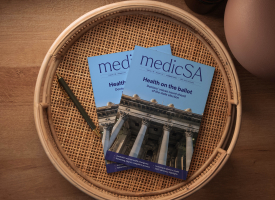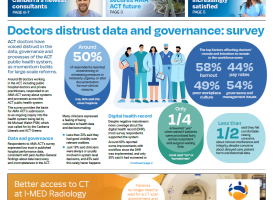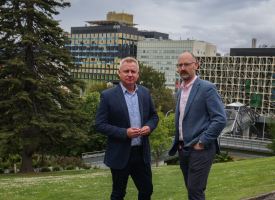Professor Robson on public hospital logjam
Transcript: AMA President, Professor Stephen Robson, on Disrupt Radio, Monday, 31 July 2023

Subject: Public hospital logjam
HOST GEORGE MCENCROE: President of the AMA, Steve Robson, thank you so much for joining me. It's a lot to cover, so I hope you've had your Weet-Bix because we need to know why people have waited so long now in emergency departments. What is going on?
STEVE ROBSON: So it's a very good question, and it's a question being asked around the country and, in fact, globally. We know that in Australia's health system, our public hospitals were struggling to cope with demand long before the pandemic hit, but through a series of fixes and Band-Aids they were able to just cope.
Pandemics put enormous stress on the public hospital system around the country, it's affected staff, and also the disruptions, as they occurred, have meant there's an enormous backlog in planned surgical procedures as you were saying in the introduction before. So hospitals are struggling to cope with a large amount of clinical work that they have to do.
If you see or present to an emergency department and need a hospital bed, there has to be a staff bed available in the hospital. One of the big problems emergency departments face is that they are holding patients in their departments who are occupying beds and staff time who really need to be admitted to the hospital. So at the other end, hospitals have enormous demand and it's very difficult for them to have patients leave hospital at the other end. Of course, when you can't get into an emergency department you end up, for example, in a ramped ambulance outside waiting to be admitted. But all of these problems have been going on for a number of years but they've been exacerbated, they've been magnified by the COVID pandemic.
GEORGE MCENCROE: So, is it a lack of staffing? Because medicine is one of the hardest degrees to get into, and a lot of nurses have struggled - I've been told this by many people - to get in. They would like to go back into hospitals but getting there after having some time out, getting reaccredited has been quite hellish, and finding a hospital that has the time to supervise a nurse who's been out for perhaps five years while she's had her own children or he's had his own kids is really hard, because obviously staff are under stress and they can't necessarily have somebody following them around and marking them and teaching them, and documenting everything that's happened. Like, is that the issue? Is it a lack of staff, or is it a lack of money to pay people, including GPs who seem to take a huge weight off the ED? There are a lot of people who are in an emergency department who could be seen by a general practitioner.
STEVE ROBSON: George, I think everything you've said is correct. We know that the pandemic has placed an enormous stress on many senior staff and a lot of people - nursing staff, medical staff, other people who work in hospitals or are perhaps near the end of their career - and the COVID pandemic has brought that decision forward, and they've decided to leave clinical work. You're correct that re-entry pathways, so nursing and other staff who've been out of the system for a year who want to go back into the system, will face challenges doing that. And I could not agree more that the key thing that's so important for the health system around the country is keeping people healthy and out of hospital in the first place.
We all know that it is difficult to see a GP, that the financial pressures mean that it's more and more expensive to have a good general practice care. So at every front, keeping people out of hospital in the first place, having the staff available to provide the care, and of course people who've finished their hospital stay and need to go back to the community need resources, places to go to and care when they leave. At every point in that chain, there are enormous stresses on the system, and it's contributed to a system that's just not coping now, George.
GEORGE MCENCROE: Well, this is the thing that's so frightening. I mean, I've had people say to me: I just wouldn't call an ambulance. I'll sit it out over the weekend and see if I can get either the very first appointment with my GP or the last appointment. And that's all fine if you have a GP that you've been seeing for a long time and they know you. But it seems that there are a lot of areas where people can't even get access to a GP. GP clinics are saying we cannot take on any new patients, and- I mean, I just don't understand how governments can't do something like run a six-week program every, I don't know, every six months to say to nurses or people who want to get back into the profession: We're just going to run a six-week intensive. We will qualify you. We will train you. We will make sure that you are up to speed with everything, and off you pop. Like, I don't know why we can't think like that.
STEVE ROBSON: So, George, you're absolutely correct. Australia has an extraordinarily committed workforce. The doctors, nurses, allied health, everybody who works in our public hospitals are great people. They want to provide care, but they need resourcing and they need support. So on the resourcing front, you need to make sure that there's sufficient resourcing in a hospital or emergency department to allow you to provide the work and the care that you want. But you're 100 per cent correct, too - support of staff, of healthcare workers, is absolutely critical. The healthcare workforce is the single biggest sector in Australia's workforce, and like so many other sectors, there are difficulties and challenges in maintaining the workforce, supporting them and making them feel valued. And I think one of the things that happened at various times at the peak of the early stages of the pandemic was a sense that some people just weren't supporting healthcare workers who were giving their all to help. And we saw protesters, we saw signs of abuse and all sorts of things going on, and those leave scars. You know, healthcare workers are human just like everybody else, and a lot of those experiences have shaped how they want to go back and work at the moment, George.
GEORGE MCENCROE: Oh, yeah. No, there is no doubt. I mean, getting all these messages and signs saying that poor behaviour won't be tolerated from your chemist to your GP tells you that some people have not coped well and are taking that out on healthcare providers. We've got to go to a little break at the moment, but when we come back, I would love to know what your vision of a fix might look like if you could stay with me, please. Steve Robson, who is President of the AMA.
[Unrelated - ad break]
GEORGE MCENCROE: I'm joined by Steve Robson who is President of the AMA, the Australian Medical Association. And Steve, I put it to you before the break; what do we do- if you were in charge, king for the day, in charge of the Federal Budget, state budgets, like, global reach, what would you do to immediately triage this situation?
STEVE ROBSON: Well, I think the first thing is, as you've done George, acknowledge that there's an issue and say: Well, look, we have to fix this. And I was delighted to see before the last Budget that the Premiers of New South Wales, Victoria, and other states, all acknowledged the fact that they've got a major problem and it is affecting the people who live in their states. If we say, what's the most efficient and effective way of dealing with the problem? Well, of course, it's to keep people healthy and away from emergency departments and hospitals in the first place. And we know that general practice and primary care are the drivers of great health for Australians. The more difficulties, the more hurdles that are placed in accessing good general practice, the less healthy people are likely to be, and the more likely conditions like diabetes or blood pressure or mental health conditions are going to spiral out of control and drive people to emergency departments. So investing not only in accessibility and equity of access to general practitioners in the short term, but making sure we have a great functional general practice workforce moving forwards. So that would be my very first step.
The next thing that I'd do is to say, well, are hospital beds being filled by people who don't need to be there? They're in hospital because they have nowhere to go, and we know that this causes hundreds of thousands of bed days to be lost in public hospitals every year. What are the big blocks? One is aged care beds access so that older Australians who've finished care have somewhere to go, and also NDIS. And we were delighted to see that the NDIS have put some navigation pathways in place to allow people who are on the NDIS to get out of hospital if they don't need to be there and into appropriate care. So keeping people out of hospitals if they don't need to be there is the second step. And the third step is to say, well, look, we have potentially half a million Australians waiting for planned surgery at the moment. That's a big driver of activity in our public hospitals. How can we resource our theatre nurses, surgeons, all of the people involved in that, to efficiently provide that care? And if you can do those three things, you going to make an enormous dent in the problem and move things forward. So they'd be my three priority areas, George.
GEORGE MCENCROE: Well, they sound like good priority areas. Somebody's texted in saying: Why ask the doctors? Their greed has caused most of this. They haven't put a name to that text.
I wonder if that is part of- is it a closed shop? Because that- like, my dad was a GP for 50 odd years, and every time this allegation was thrown around, he'd call it doctor bashing. But there is something about the- given how hard it is to get a position at a university to train as a physician, that does keep it a very small sector of expertise. And when we need more of them, is there a way- I mean, not that you want people who are rubbish to become doctors, obviously. But are there ways in which we could have paramedical people doing a lot of the work that is currently being done by- you know, is it a closed shop, in other words?
STEVE ROBSON: So one of the things that might surprise you, George, is that Australia does not at the moment have a dedicated agency that is devoted to assessing-planning the healthcare workforce. We used to have one about ten years ago, but that was disbanded and defunded in about 2014. So it's hard to get results if you're not working to a plan. So we know that training nurses, training doctors, training physiotherapists, training pathology workers, all of the people who make up the workforce that staff our public hospitals and our general practices takes time and takes expertise. And you need people to actually provide the training and you need to make it a worthwhile career. So if you look at the sources of healthcare workforce in Australia, they are the Australians we train ourselves and the workers who train overseas and wish to come to Australia. Making sure the pathways to have already-trained healthcare workers enter Australia, help our workforce and join it is absolutely critical, and I'm pleased that that work is beginning with the government at the moment. But I agree with you completely. We need pathways that allow people with the right aptitude and the right level of motivation. And I think we need to go back to the sort of system we had ten years ago where these things were planned and things were a lot more smooth, George.
GEORGE MCENCROE: Yeah, that sounds like a good idea. Teamwork makes the dream work. Thank you so much for your time this [audio skips] 511. If you want to talk about your experience of perhaps waiting or going to an ambulance or calling an ambulance or sitting in an ED, I'd love to hear from you. George McEncroe on Disrupt Radio.



